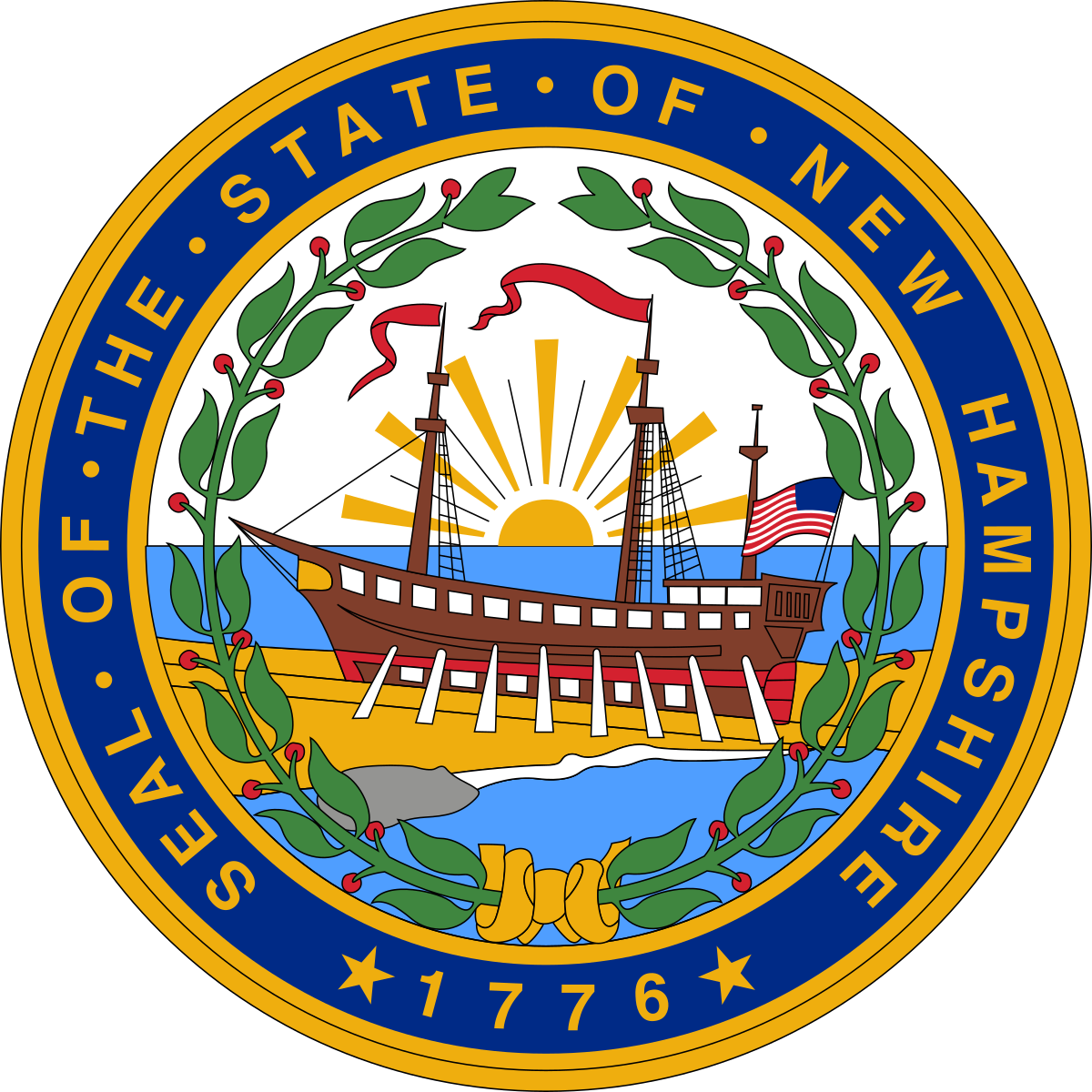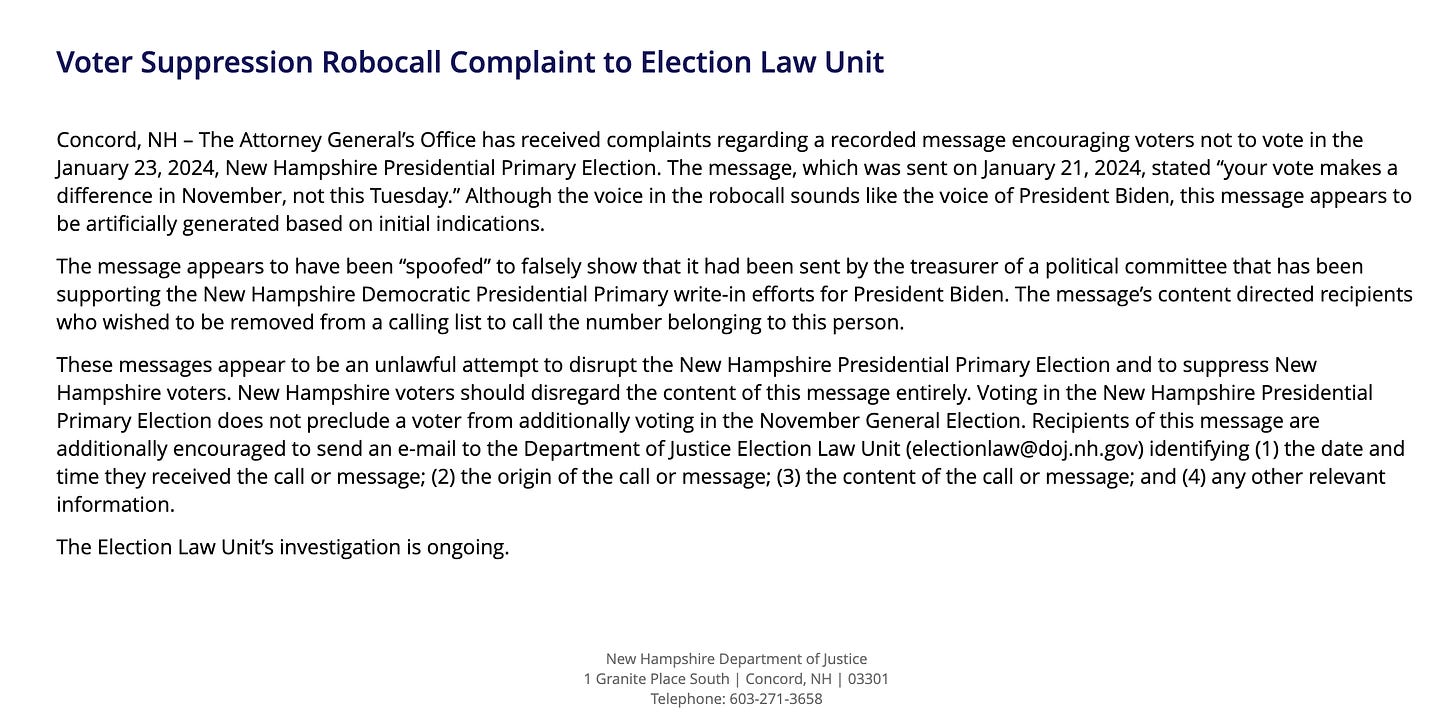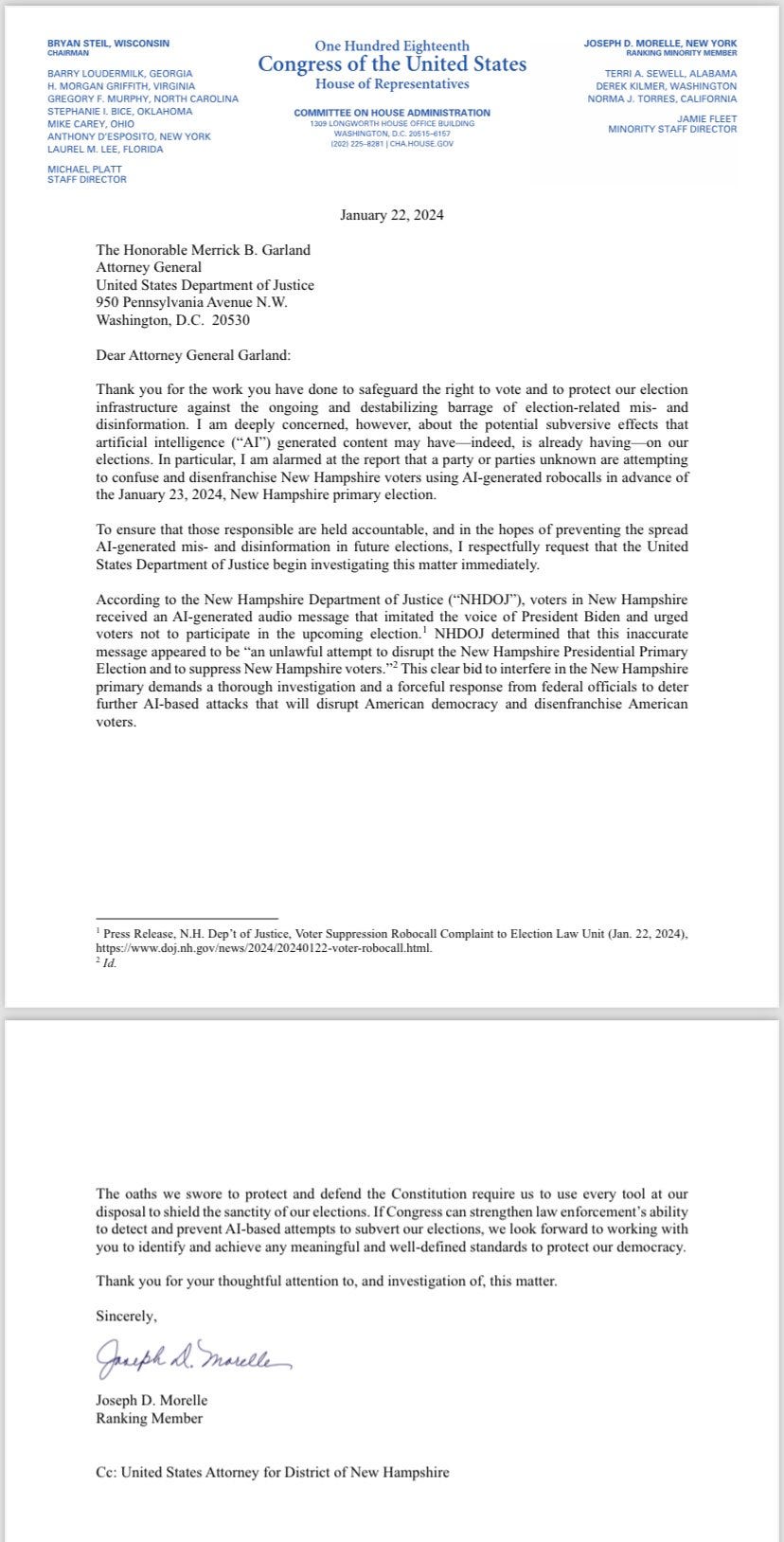I’m told that it’s difficult to predict the outcome of the New Hampshire primary on Tuesday because independent or undeclared voters can choose to vote a ballot for either party. Polls don’t seem to have drilled down on this feature of the landscape. And because of the squabble on the Democratic side over whether New Hampshire or South Carolina would go first (New Hampshire moved up its primary date to circumvent the DNC’s decision it would be South Carolina), there isn’t a real Democratic presence in the primary, although a strong write-in campaign for Biden, who has never won the state in a primary race, is underway. Tomorrow could be a day that brings unpredictable results.
Early on Monday, I received a few calls from friends in New Hampshire alerting me to a new problem. A robocall using AI to fake a message from Joe Biden was urging Democratic voters to “save your vote” for November. The message began with a very convincing imitation of Biden using his signature “holy malarkey” line. One friend told me it was such a good fake and so convincing that had they not known the story, there would have been no reason to think the call wasn’t from the President.
This is classic voter suppression. And New Hampshire is no stranger to it. In 2002, robocalls were used to jam phone lines as Democratic volunteers were in the process of getting out the vote for then-Governor Jeanne Shaheen, who was running for the Senate. She narrowly lost the race, and subsequently, the former director of New Hampshire’s Republican Party was convicted of charges connected to the telephone interference.
By early afternoon on Monday, New Hampshire’s state attorney general was investigating the calls and also encouraging people who had received them to make a report to DOJ’s election law unit. Because the election is a federal one, the Justice Department has jurisdiction to investigate instances of voter suppression. New Hampshire’s AG advised voters in the state that they should “disregard the content of this message entirely” and that “voting in the New Hampshire Presidential Primary Election does not preclude a voter from additionally voting in the November General Election.”
Federal prosecutors could look at charges, including harassing telephone calls under 47 U.S.C. §223, conspiracy to deny voting rights under 18 U.S.C. §241, and/or conspiracy under 18 U.S.C. §371, depending on the facts they learn and whether they are able to identify those responsible.
These sorts of efforts at voter suppression have been standard fare across multiple elections in the south, with an aim to suppress Democratic voters, often targeting Black communities. Before Trump, there wasn’t nearly as much public conversation about election stealing, voter fraud, and voter suppression, except maybe right at election time. But for the lawyers who handled these issues, they were never far from our minds. Over the years, I received numerous complaints about mailers to Black communities in North Birmingham telling voters that “their day” to vote was the Thursday following the election or the following Tuesday. While most voters were too smart to fall for these ruses, the effort to deprive people of their right to vote is despicable, and it's encouraging to see authorities in New Hampshire getting straight to work.
Early Monday evening, Congressman Joseph Morelle (D-NY), the ranking member of the Committee on House Administration, wrote to U.S. Attorney General Merrick Garland asking him to open an investigation. He sent a copy to the U.S. Attorney in New Hampshire.
As we know from the aftermath of the 2020 election, DOJ policy prohibits it from engaging in conduct that would determine or change the outcome of an election. But where, as here, the charge is suppression of the vote, there is no reason they can’t investigate to develop evidence while the situation is fresh and before evidence can spoil. This is not about the outcome of the election; it’s about an effort to deprive people of their right to vote.
Voter suppression has always been a feature of the election landscape, and too often, it has gone unaddressed. Historically, more effort has been put into addressing allegations of voter fraud, although a 2022 report from the Brennan Center concluded that most allegations of fraud turn out to be baseless and that most of the few remaining allegations reveal irregularities and other forms of election misconduct. Voter fraud is extremely rare and does not change the outcome of federal elections, despite what some politicians would have us believe.
Long before Trump amped up the voter fraud narrative on steroids, conservatives would use it to claim there was rampant voter fraud in their state or county. They insisted people who weren’t eligible to vote because they had prior felony convictions or “illegal alien” status voted anyway. There were claims of people voting more than once, or my favorite fake claim, that dead people were voting, i.e., that people cast ballots in the names of the deceased. These allegations were used to justify all sorts of measures that made it more difficult for people to vote. The unspoken goal was to make it more difficult for Democrats and especially Black voters.
Ahead of the 2018 midterm elections, the Washington Post wrote a story with this lede: “President Trump and Attorney General Jeff Sessions on Monday issued strong warnings about the threat of voter fraud in Tuesday’s elections, echoing the president’s baseless claims that massive voter fraud marred his 2016 election and prompting accusations that his administration is trying to intimidate voters.” The headline for the story was “Without evidence, Trump and Sessions warn of voter fraud in Tuesday’s elections.” But voter fraud isn’t the problem with our elections; voter suppression is.
So the next time someone wants to tell you how horrible voter fraud is, ask them to look at the facts and be concerned about the real problem, voter suppression, which surfaced in an ugly way in New Hampshire on Monday. The insertion of an AI fake in an effort to persuade voters to stay home is a new and pernicious development that will require people to increasingly be on guard and vet sources of information about elections carefully. Rely on your area's local voting registrar or the bipartisan League of Women Voters. Go to your secretary of state’s website for accurate information. In an era of disinformation, smart voters will have to be increasingly vigilant.
We’re in this together,
Joyce







Everyone everywhere needs to demand that voting absentee be implemented wherever one lives.. then vote that way..
I received my Democratic absentee ballot in SC today and will be delivering it by hand to Election Headquarters in the morning. It is an act of faith only as there are only three names; my BIDEN, Dean Phillips and Marianne Phillips, the latter two unlikely to get a significant number of votes. But I have it in my hands and somehow that feels like a huge win.🏆